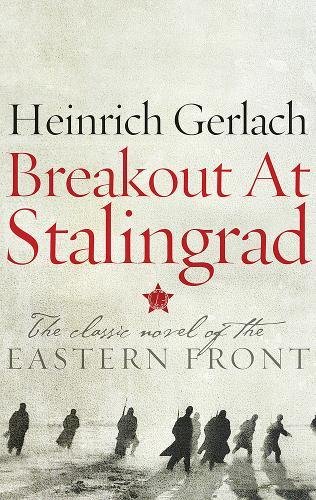When Heinrich Gerlach finally returned home to Germany after seven years as a POW in the Soviet Union, he left behind the novel of his experiences inside the cauldron of Stalingrad. The novel was confiscated by the Soviets and Gerlach struggled for the next few years to reconstruct his work. He turned to hypnotism and through that experience was able to reconstruct his memories into The Forsaken Army, which was published in 1957. In 2012, while researching Gerlach and the other members of the League of German Officers in the Russian State Military Archive, Carsten Gansel rediscovered the original 614 page manuscript of Gerlach’s original novel, Breakout at Stalingrad.
Breakout at Stalingrad opens in November 1942 as the German troops of the Sixth Army are digging in around the besieged city of Stalingrad on the Volga. As they start to settle in for the winter, the Russians launch a huge counterattack which encircles the besiegers and traps them hundred of miles from their lines. Gelach splits his narrative through a number of voices scattered around the front. Breaking the novel into three sections, we witness, mainly through the eyes of Gerlach’s proxy, First Lieutenant Bauer, the disintegration of an army of 300,000 men. As the cold and the Russians tightens their grip around the Sixth Army, we see Gerlach’s cast start to fragment. The promises and the dreams from high command and Hitler that they would be supplied via an air bridge, that von Manstein is coming or that they would be breaking out to the west to rejoin the rest of the army, slowly start crumbling. Gerlach frames the passage of time through discussions of the men as to which of these will happen, all the while death creeps closer. The dead stop becoming fallen comrades and become sign posts, as people will not steal a human corpse to eat as they would a horses. The snow deepens, the food and ammunition start to run out. The German guns start to fall silent while the Russian’s only grow louder, closer and more frequent.
The novel is set within vignettes of Gerlach’s intersecting cast of characters. From quick visits to General Paulus’ HQ to ever increasing time spent with two chaplains of different denominations who struggle to offer solace to vast numbers of the dead and dying, Gerlach gives us a bottom up view of the frozen hell he and his comrades were trapped in. The violence of battle is sudden and unremitting. One moment a character is there, the next the snow is red and they are gone. There are few battle scene set pieces, instead we get a much more moving portrait of the different ways people react to war. We have the gungho, the opportunists, the realists, the believers and the cowards. We see the noose tighten through each of their eyes and we see how they each react to that. Death was a release, to be wounded was a slow journey deeper into the hell those poor men were trapped in. We see the cast slowly whittled away for nothing.
Breakout at Stalingrad is a fascinating read. While the characters Gerlach has created are engaging and the situation terrible, I found myself longing for the end, to escape. The oppression that Gerlach so comprehensively weaves into his novels is the perfect feeling to endure while reading his tale. Oddly, it was only after finishing the novel that I understood this. That you don’t really want to go on at some points is testament to what Gerlach has captured on the page and only a glimpse of the experience he endured.
It is far too easy to relegate the German soldier’s experience of the Second World War to that of the grey cannon fodder nearly 80 odd years of film and popular culture. The nightmare that the Third Reich unleashed on Europe is one we are still reckoning with and trying to understand. But the experience of the ordinary soldier, airman or sailor sent into battle against incredible odds and expected, by all those indoctrinated at home, to die before taking a step back is one we have neglected. That, with good reason, few wanted to share their experience afterwards means we have few resources to draw on to add colour to the men who fought is a terrible pity. Gerlach’s Breakout at Stalingrad is oppressive and hard to read, but gives us a vital insight into the men who were sent into the steppes and left there to die by a regime for which life, even that of their own men, was far beyond even an afterthought.
Breakout at Stalingrad by Heinrich Gerlach (translated by Peter Lewis) is out now and published by Apollo (Head of Zeus), who kindly provided this review copy.


